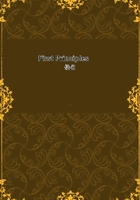
第128章
Society in its first and lowest stage is a homogeneous assemblage of individualshaving like powers and like functions: the only marked difference of functionbeing that which accompanies difference of sex. Every man is warrior, hunter,fisherman, tool-maker, builder; every woman performs the same drudgeries;every family is self-sufficing, and, save for purposes of companionship,aggression, and defence, might as well live apart from the rest. Very early,however, in the course of social evolution, we find an incipient differentiationbetween the governing and the governed. Some kind of chieftainship soon arisesafter the advance from the state of separate wandering families to that ofa nomadic tribe. The authority of the strongest and cunningest makes itselffelt among savages, as in a herd of animals or a posse of schoolboys: especiallyin war. At first, however, it is indefinite, uncertain; is shared by othersof scarcely inferior power; and is unaccompanied by any difference in occupationor style of living: the first ruler kills his own game, makes his own weapons,builds his own hut, and, economically considered, does not differ from othersof his tribe. Along with conquests and the massing of tribes, the contrastbetween the governing and the governed grows more decided. Supreme powerbecomes hereditary in one family; the head, first military and then political,ceasing to provide for his own wants, is served by others; and he beginsto assume the sole office of ruling. At the same time there has been arisinga co-ordinate species of government -- that of Religion. Ancient recordsand traditions show that the earliest conquerors and kings came to be regardedas divine personages. The maxims and commands they uttered during their liveswere held sacred after their deaths, and were enforced by their divinely-descendedsuccessors; who in their turns were promoted to the pantheon of the race,there to be worshipped and propitiated along with their predecessors. Fora long time these connate forms of government -- civil and religious -- remainclosely associated. For many generations the king continues to be the chiefpriest, and the priesthood to be members of the royal race. For many agesreligious law continues to contain more or less of civil regulation, andcivil law to possess more or less of religious sanction; and even among themost advanced nations these two controlling agencies are by no means completelydifferentiated from each other. Having a common root with these, and graduallydiverging from them, we find yet another controlling agency -- that of Mannersor ceremonial usages. Titles of honour were originally the names of the god-king;afterwards of God and the king; still later of persons of high rank; andfinally came, some of them, to be used between man and man. Forms of complimentaryaddress were at first expressions of propitiation from prisoners to theirconqueror, or from subjects to their ruler, either human or divine -- expressionsthat were afterwards used subordinate authorities, and slowly descended intoordinary intercourse. Modes of salutation were once signs of subjection toa victor, afterwards obeisances made before the monarch and used in worshipof him when dead. Presently others of the god-descended race were similarlysaluted; and by degrees some of the salutations have become the due of all.* Thus, no sooner does the originally homogeneous socialmass differentiate into the governed and the governing parts, than this lastexhibits an incipient differentiation into religious and secular-Church andState; while at the same time or still earlier there begins to take shape,that less definite species of government which rules our daily intercourse-- a species of government which, as we may see in heralds' colleges, inbooks of the peerage, in masters of ceremonies, is not without a certainembodiment of its own. Each of these kinds of government is itself subjectto successive differentiations. In the course of ages, there arises, as amongourselves, a highly complex political organization of monarch, ministers,lords and commons, with their subordinate administrative departments, courtsof justice, revenue offices, etc., supplemented in the provinces by municipalgovernments, county governments, parish or union governments -- all of themmore or less elaborated. By its side there grows up a highly complex religiousorganization, with its various grades of officials from archbishops downto sextons, its colleges, convocations, ecclesiastical courts, etc.; to allwhich must be added the ever-multiplying independent sects, each with itsgeneral and local authorities. And simultaneously there is developed a complicatedsystem of customs, manners, and temporary fashions, enforced by society atlarge, and serving to control those minor transactions between man and manwhich are not regulated by civil and religious law. Moreover, it is to beobserved that this increasing heterogeneity in the governmental appliancesof each nation, has been accompanied by an increasing heterogeneity in thegovernmental appliances of different nations. All peoples are more or lessunlike in their political systems and legislation, in their creeds and religiousinstitutions, in their customs and ceremonial usages.